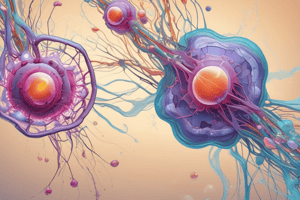Podcast
Questions and Answers
जीव की अंग्रेजी में उपशाखा को हिंदी में क्या कहा जाता है?
जीव की अंग्रेजी में उपशाखा को हिंदी में क्या कहा जाता है?
- सेल
- ऊतक
- कोशिका (correct)
- ल्यूकोसाइट
प्रोकैरियोटिक कोशिकाएँ किसमें पाई जाती हैं?
प्रोकैरियोटिक कोशिकाएँ किसमें पाई जाती हैं?
- माइक्रोबिया (correct)
- मछली
- माइकोराइंसा
- मक्खी
कोशिका विज्ञान का वह शाखा है जो क्या के संरचना, कार्य और जैवरसायन के संबंध में विशेषज्ञता प्राप्त करती है?
कोशिका विज्ञान का वह शाखा है जो क्या के संरचना, कार्य और जैवरसायन के संबंध में विशेषज्ञता प्राप्त करती है?
- पौधों
- कोष्ठक (correct)
- प्रोटीन
- प्राणी
कौनसा संगठनिक अंग है जो कोशिका के नियंत्रण केंद्र में आनुवांशिक सामग्री को संग्रहित करता है?
कौनसा संगठनिक अंग है जो कोशिका के नियंत्रण केंद्र में आनुवांशिक सामग्री को संग्रहित करता है?
कौनसा संरचना प्रोटीन संघटना की रिप्लिकेशन में सहायक होता है?
कौनसा संरचना प्रोटीन संघटना की रिप्लिकेशन में सहायक होता है?
कौनसी कोशिका वृद्धि में सहायक होने वाली प्रक्रिया है?
कौनसी कोशिका वृद्धि में सहायक होने वाली प्रक्रिया है?
कोशिका विभाजन, कोशिका मृत्यु, और कोशिका विविधीकरण के नियंत्रण कौन-कौन से मार्ग से होता है?
कोशिका विभाजन, कोशिका मृत्यु, और कोशिका विविधीकरण के नियंत्रण कौन-कौन से मार्ग से होता है?
कोशिका में ऊर्जा उत्पादन किस प्रक्रिया के माध्यम से होता है?
कोशिका में ऊर्जा उत्पादन किस प्रक्रिया के माध्यम से होता है?
कोशिकाओं में खनिज पदार्थों का विघटन किस प्रक्रिया से होता है?
कोशिकाओं में खनिज पदार्थों का विघटन किस प्रक्रिया से होता है?
कोशिकाओं के भीतर संपूर्ण रासायनिक प्रतिक्रियाओं का समूह को क्या कहा जाता है?
कोशिकाओं के भीतर संपूर्ण रासायनिक प्रतिक्रियाओं का समूह को क्या कहा जाता है?
Study Notes
Biology: Exploring the World of Cells
Biology is the study of life and living organisms. It encompasses a wide range of disciplines, including cell biology, genetics, evolution, ecology, and much more. In this article, we will focus on cell biology, which is the foundation of all living organisms.
What is Cell Biology?
Cell biology is the branch of biology that deals with the structure, function, and biochemistry of cells, the fundamental unit of life. It involves the study of various cellular components and processes, such as cell division, cell growth, cellular metabolism, and cell signaling. Cell biology is crucial for understanding normal cellular processes as well as the development of diseases.
Cells: The Building Blocks of Life
Cells are the basic building blocks of all living organisms. There are two main types of cells: prokaryotic and eukaryotic. Prokaryotic cells lack a true nucleus and are found in bacteria and archaea. Eukaryotic cells have a true nucleus and are found in organisms such as animals, plants, fungi, and protists.
Eukaryotic cells are much larger than prokaryotic cells and contain various organelles, which are specialized structures that perform specific functions. Some of the main organelles in eukaryotic cells include:
- Nucleus: The control center of the cell where genetic material is stored.
- Mitochondria: The powerhouse of the cell where energy is produced.
- Ribosomes: Structures where protein synthesis occurs.
- Endoplasmic Reticulum (ER): A network of tubes involved in protein synthesis and lipid metabolism.
- Golgi apparatus: Involved in the modification, sorting, and packaging of proteins and lipids.
- Lysosomes: Membrane-bound organelles that contain digestive enzymes to break down cellular waste.
- Peroxisomes: Organelles that contain enzymes involved in oxidative reactions.
- Vacuoles: Membrane-bound organelles that store water, nutrients, and waste products.
Cell Division and Growth
Cell division is the process by which cells reproduce and grow. There are two main types of cell division: mitosis and meiosis. Mitosis is a type of cell division that occurs in somatic cells (non-reproductive cells) and results in the formation of two identical daughter cells. Meiosis is a type of cell division that occurs in reproductive cells (gametes) and results in the formation of four genetically diverse daughter cells.
Cell growth, on the other hand, is the process by which cells increase in size and mass. It involves the synthesis of various macromolecules such as DNA, RNA, and proteins. Cell growth is regulated by a complex network of signaling pathways that control cell division, cell death, and cell differentiation.
Cellular Metabolism and Energy Production
Cellular metabolism is the set of chemical reactions that occur within cells to maintain life. It includes the processes of catabolism (breakdown of macromolecules to release energy) and anabolism (synthesis of macromolecules from smaller molecules).
Energy production in cells occurs through a process called cellular respiration. It involves the breakdown of glucose and other organic molecules to release energy in the form of ATP (adenosine triphosphate). This process occurs in the mitochondria of eukaryotic cells.
Cell Signaling and Communication
Cells communicate with each other through a process called cell signaling. It involves the transmission of signals from one cell to another using various molecules such as hormones, neurotransmitters, and growth factors. Cell signaling plays a crucial role in regulating various cellular processes such as cell division, cell growth, and cell differentiation.
Conclusion
Cell biology is a fascinating and complex field that provides valuable insights into the structure, function, and biochemistry of cells. It is an essential foundation for understanding the biology of all living organisms. By studying cell biology, we can gain a deeper understanding of normal cellular processes and the development of various diseases.
Studying That Suits You
Use AI to generate personalized quizzes and flashcards to suit your learning preferences.
Description
Explore the fascinating world of cell biology, the branch of biology that deals with the structure, function, and biochemistry of cells - the fundamental unit of life. Learn about the different types of cells, organelles, cell division, cellular metabolism, energy production, and cell signaling.




